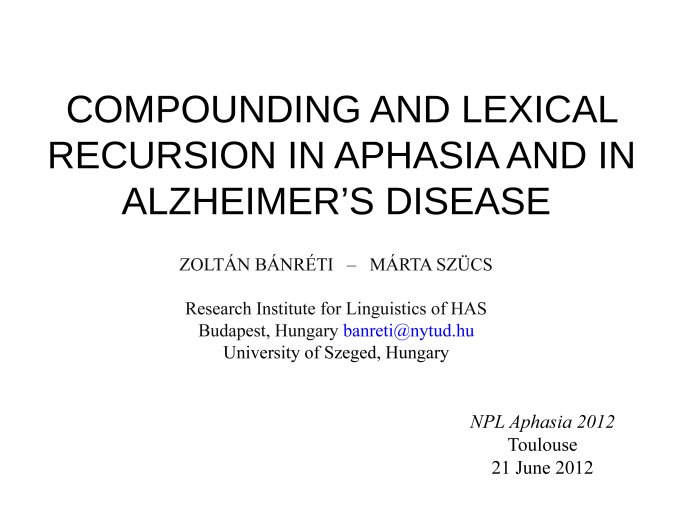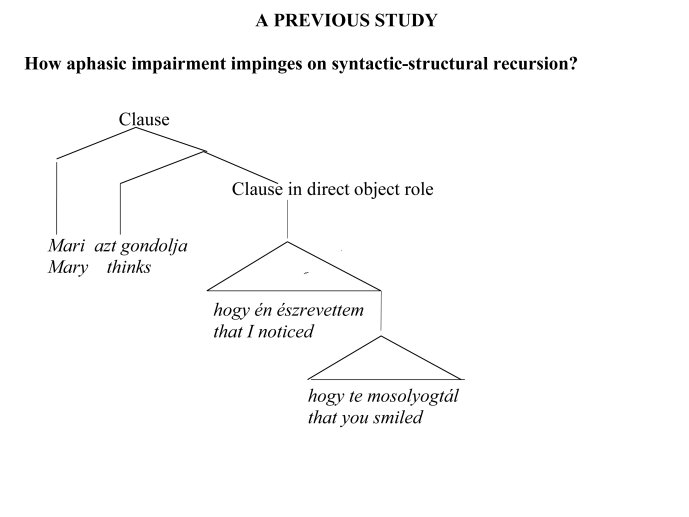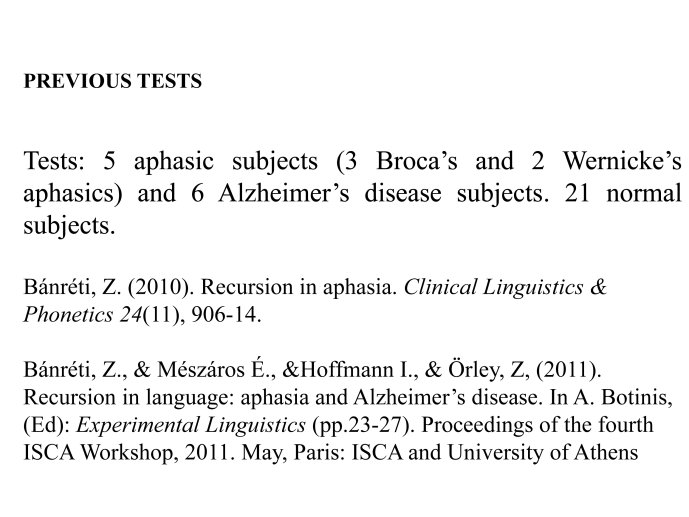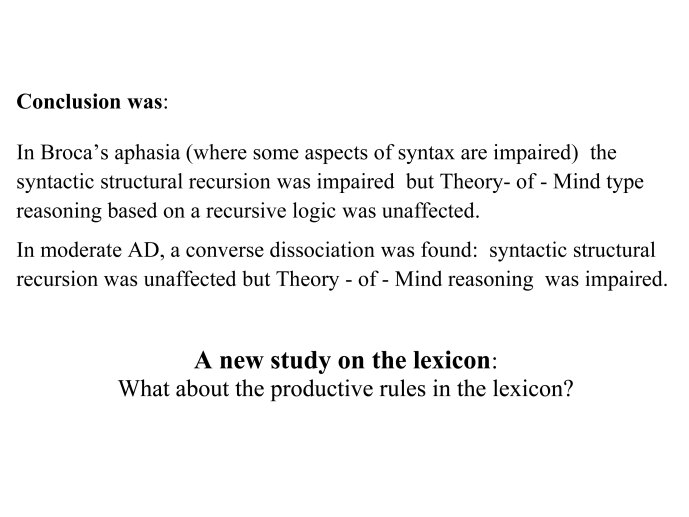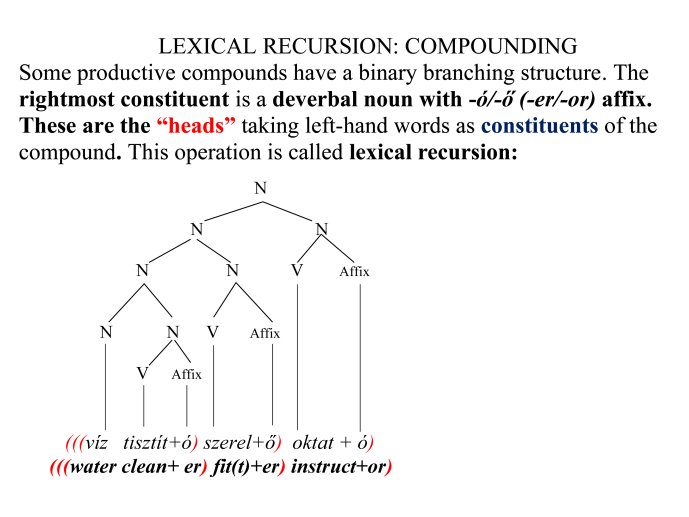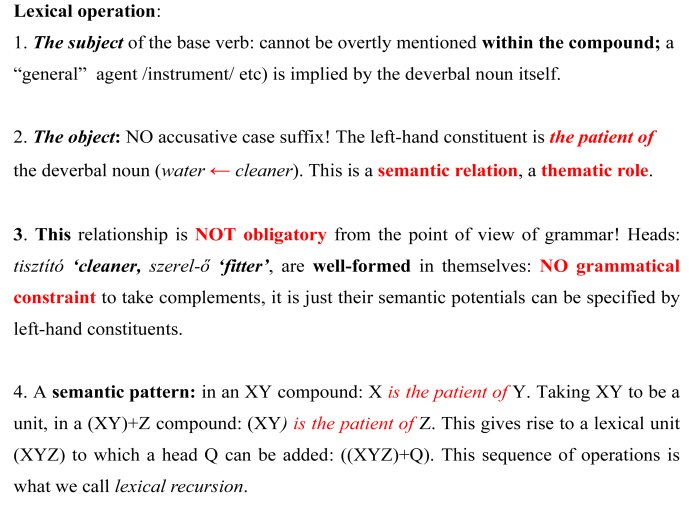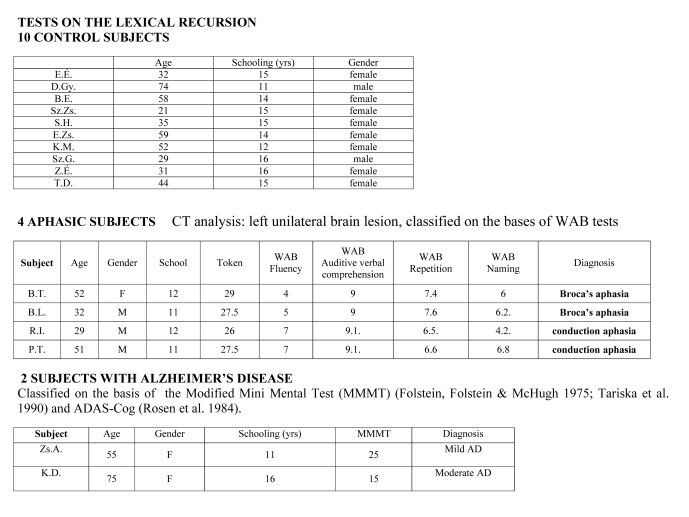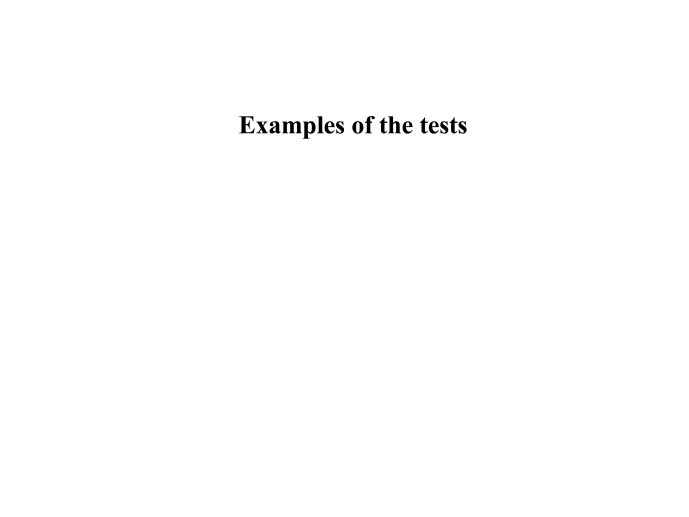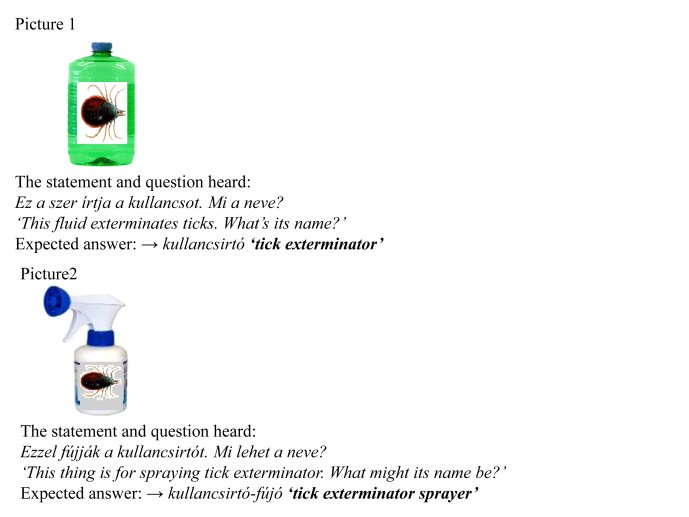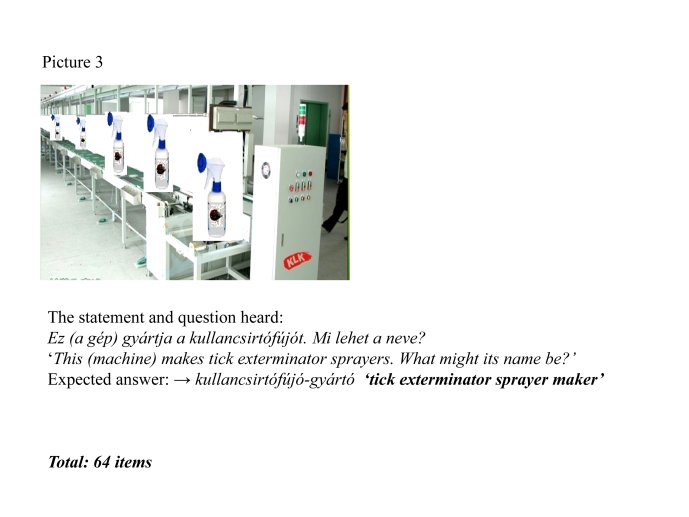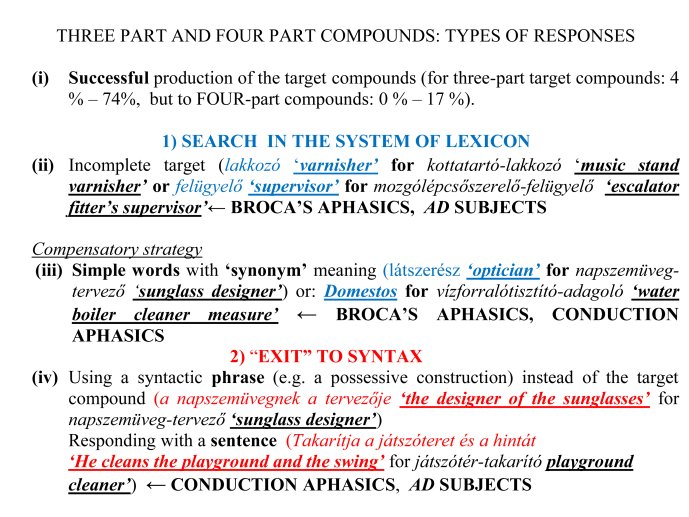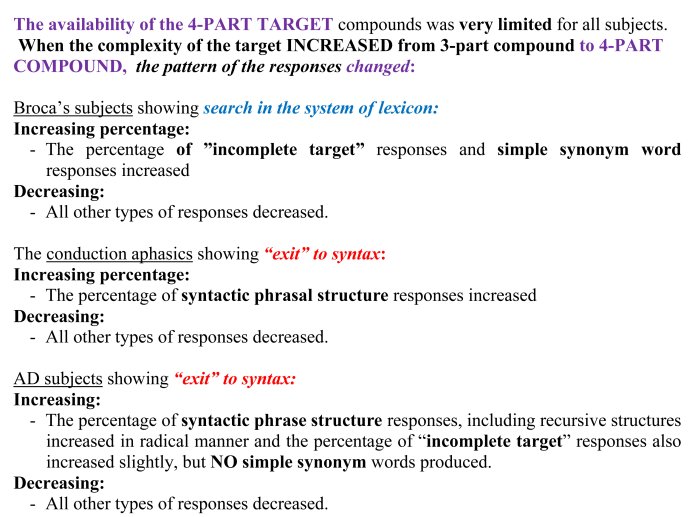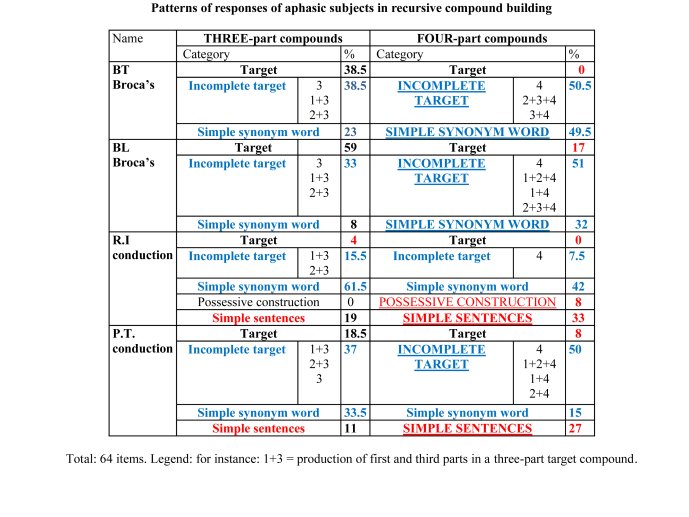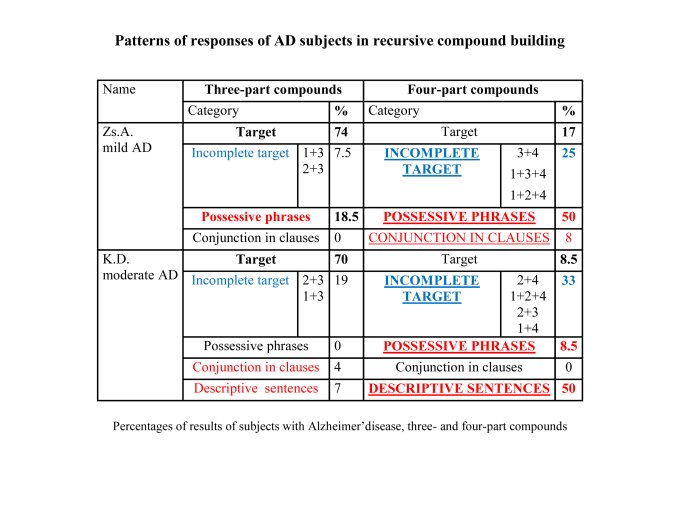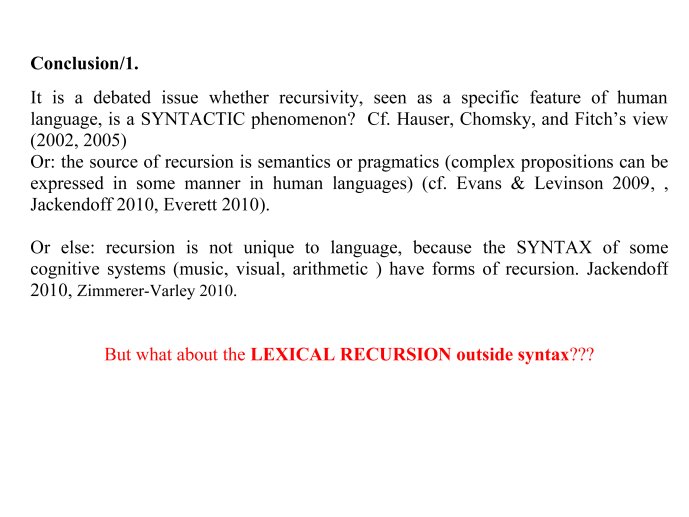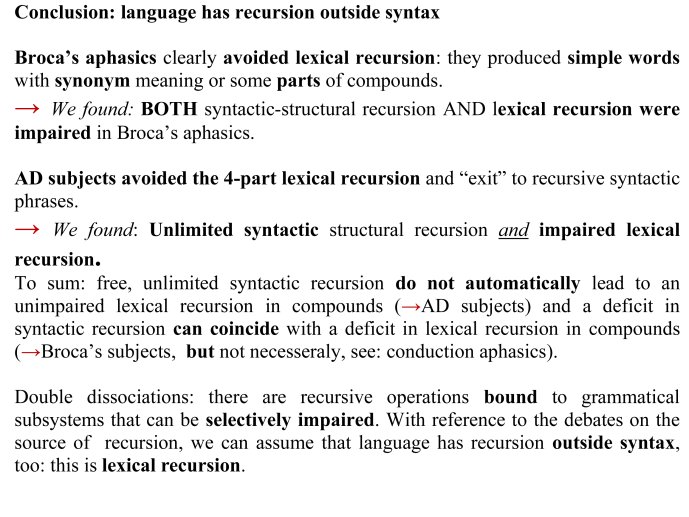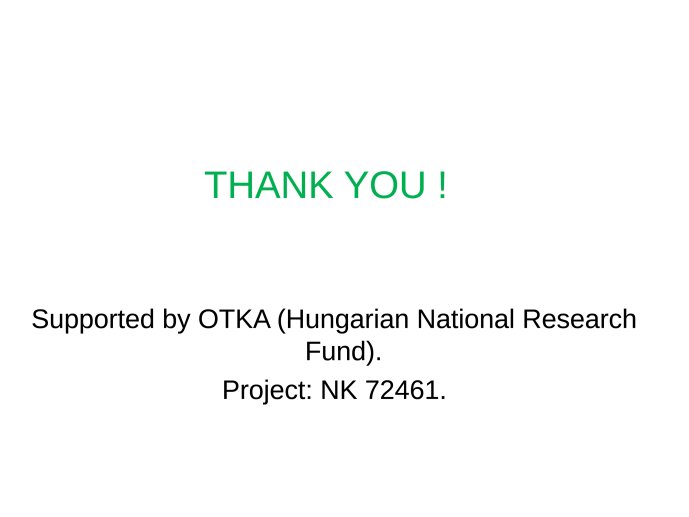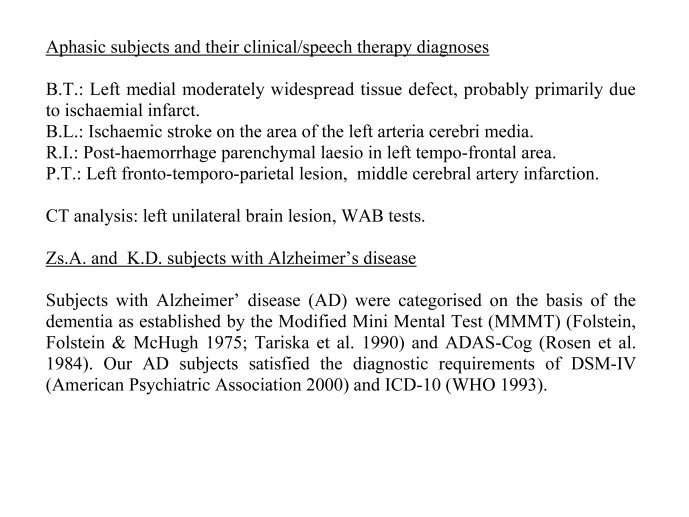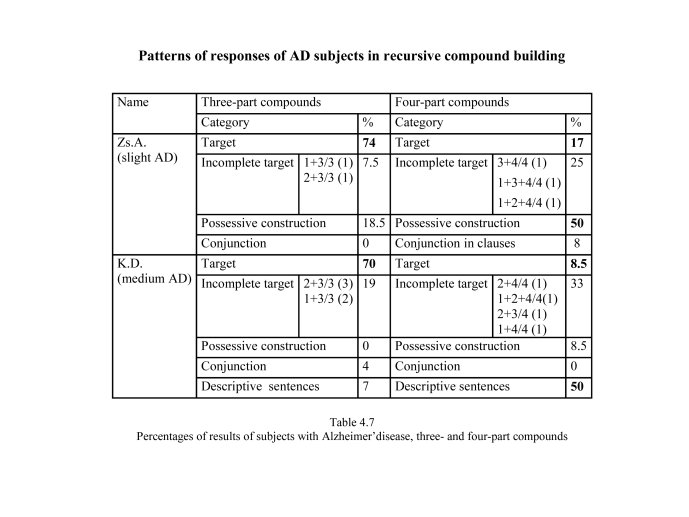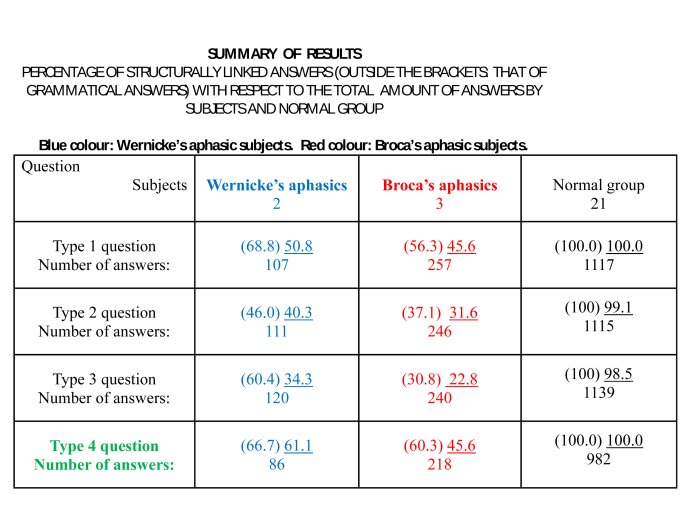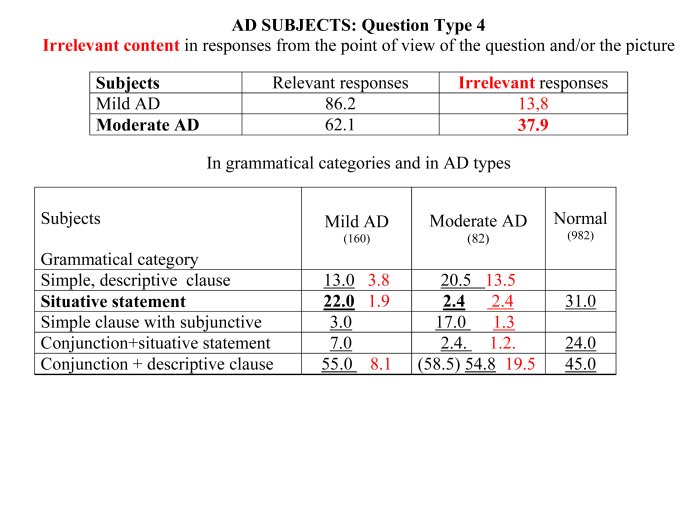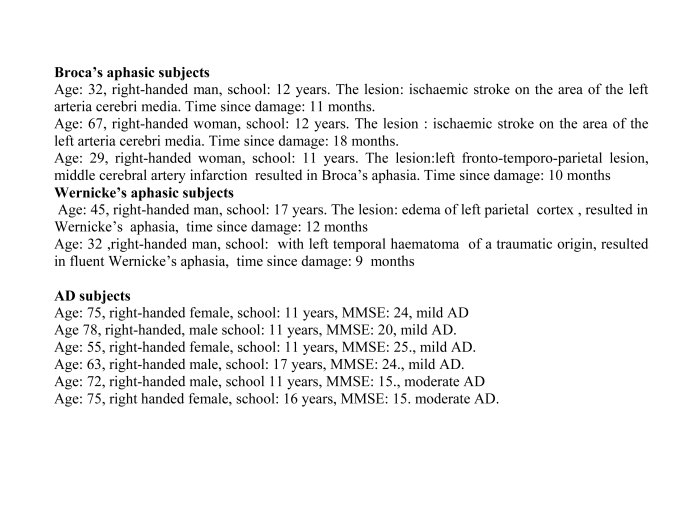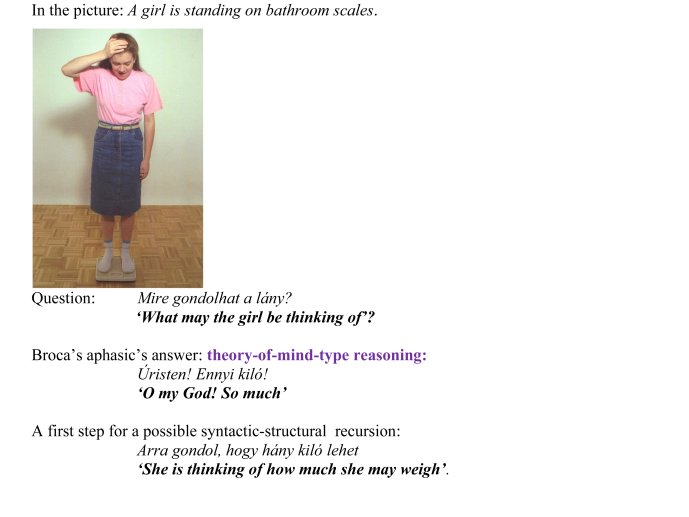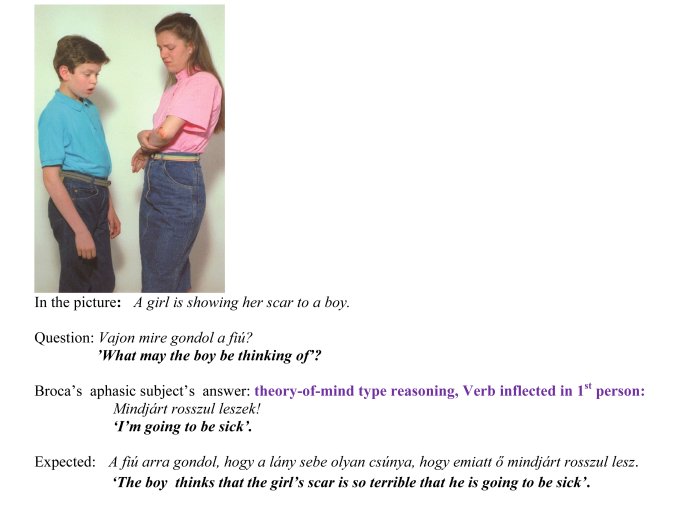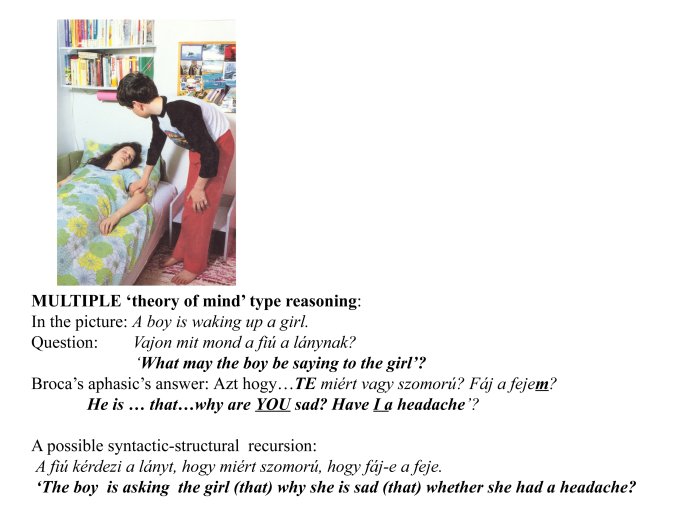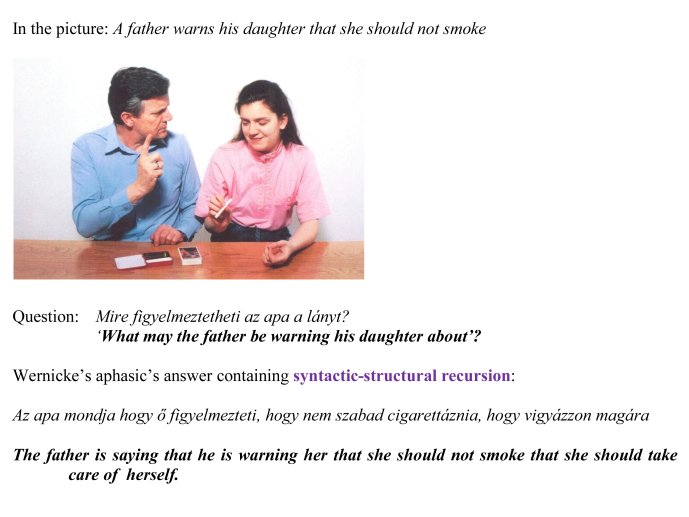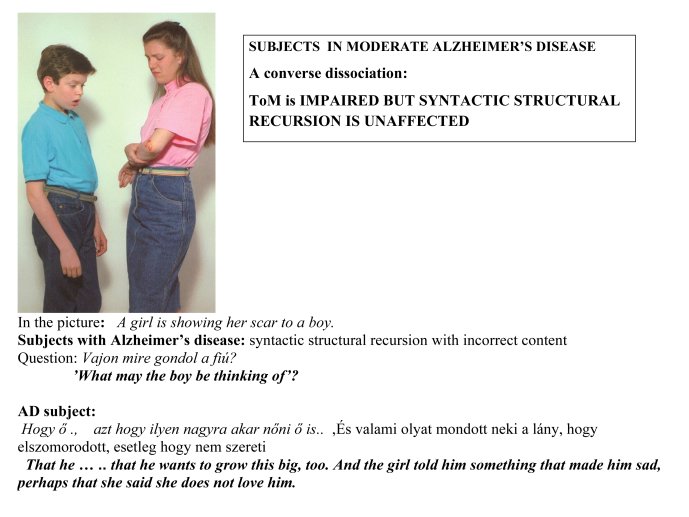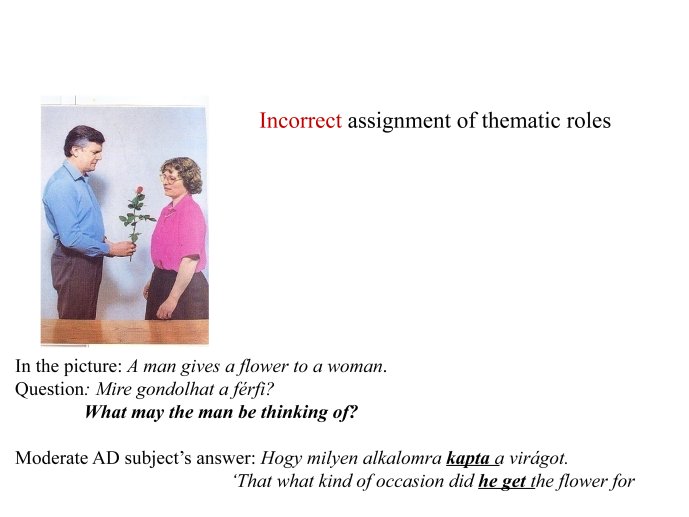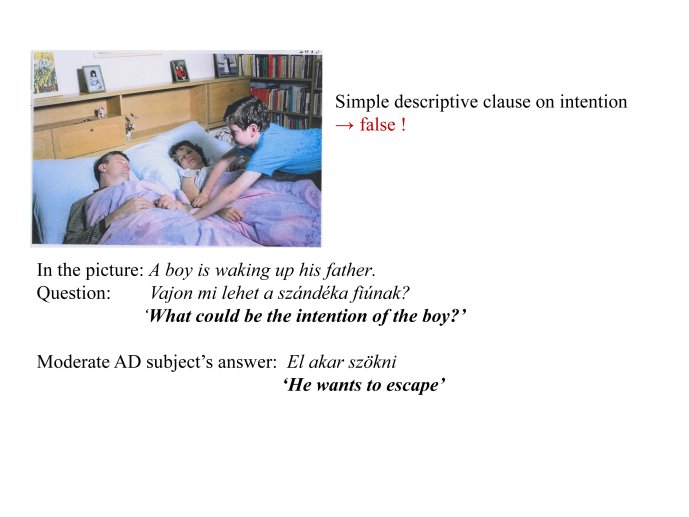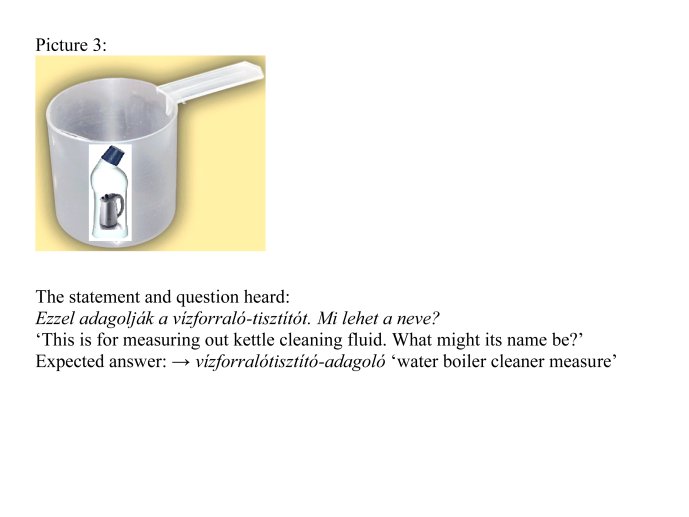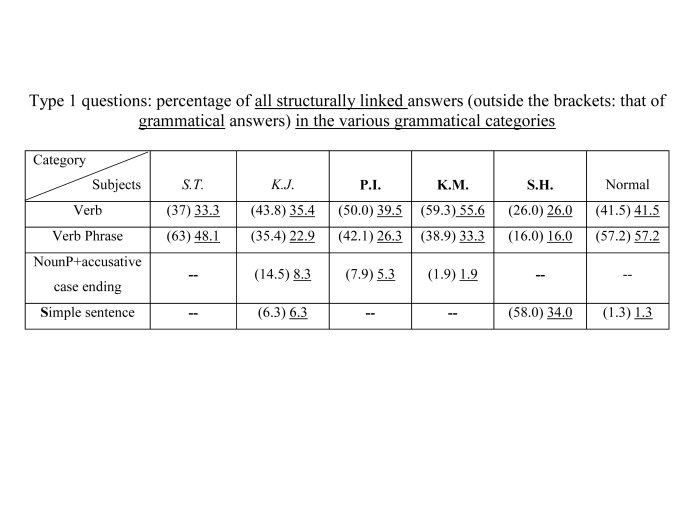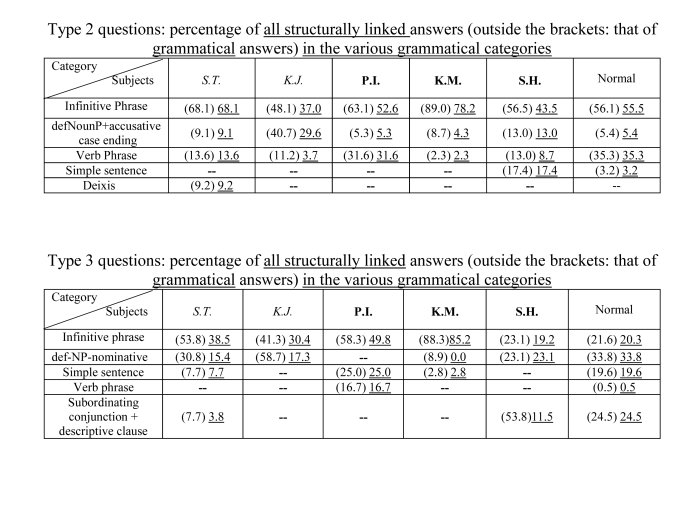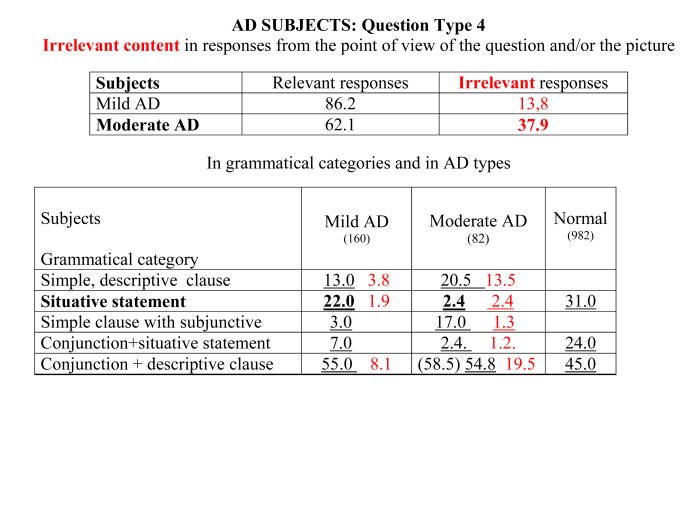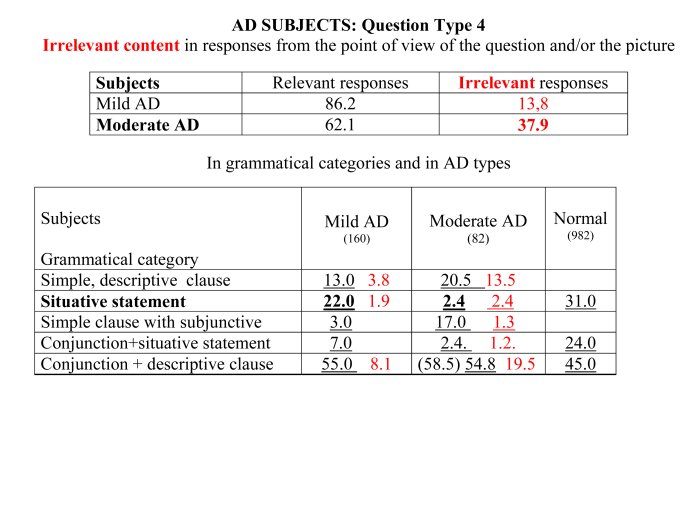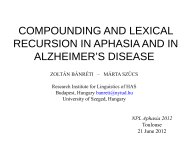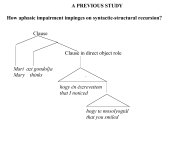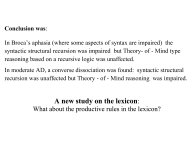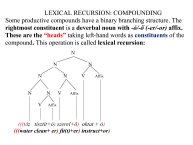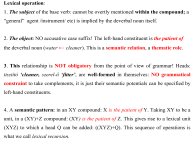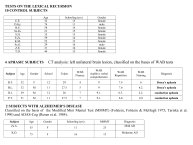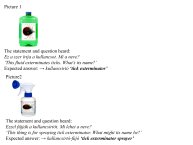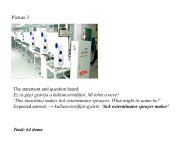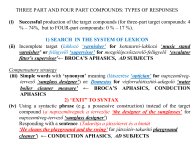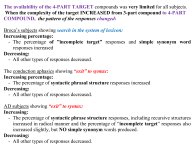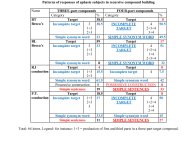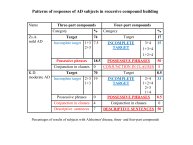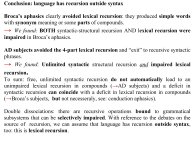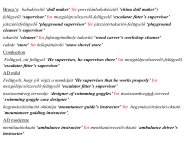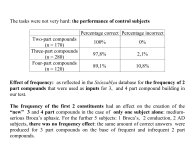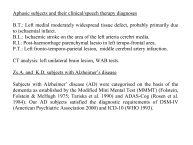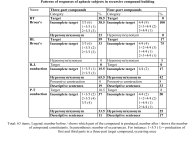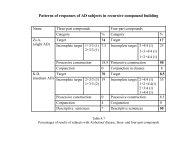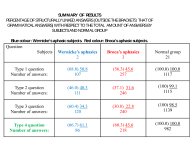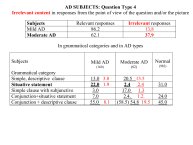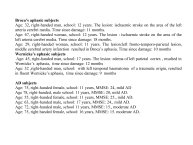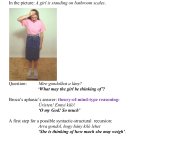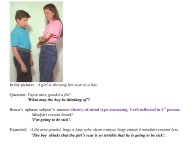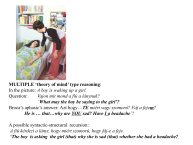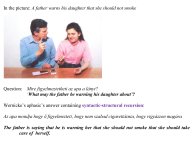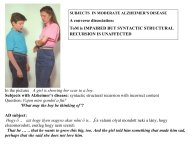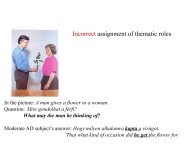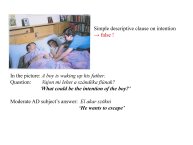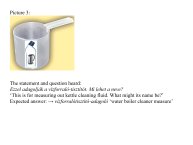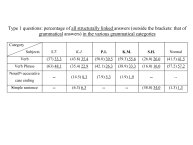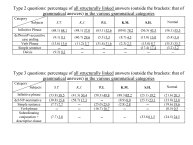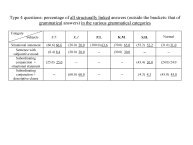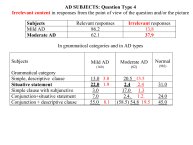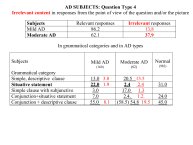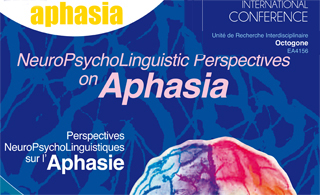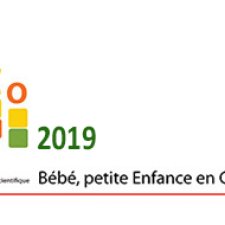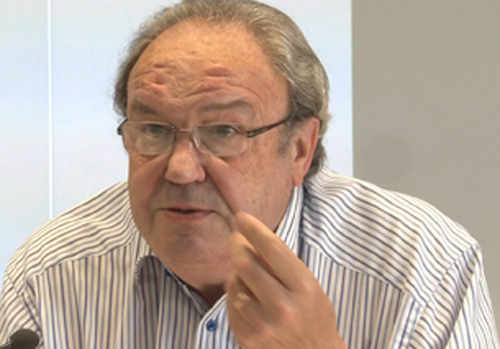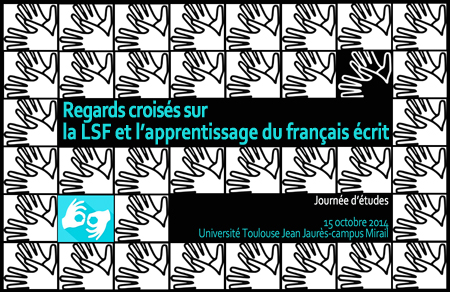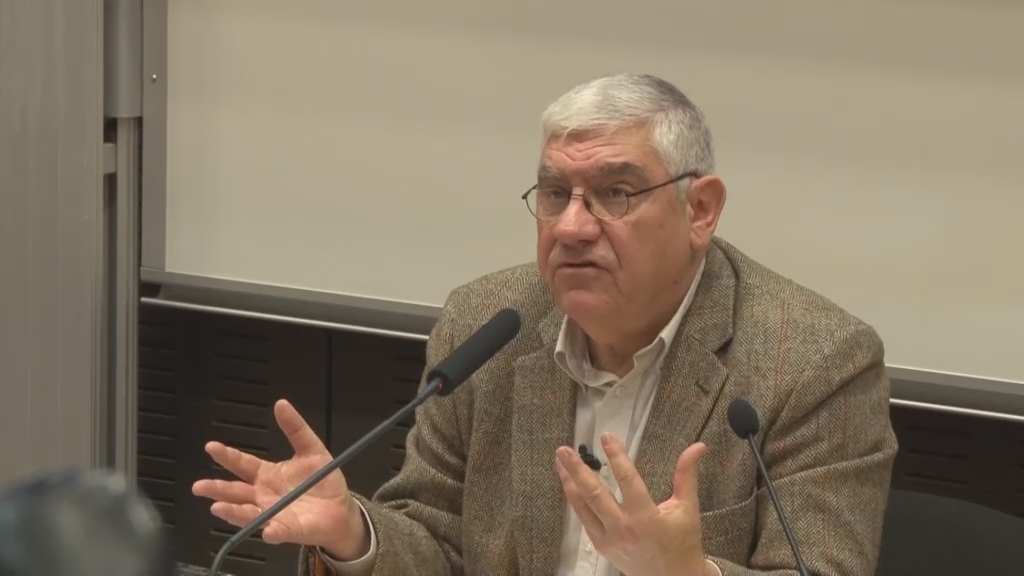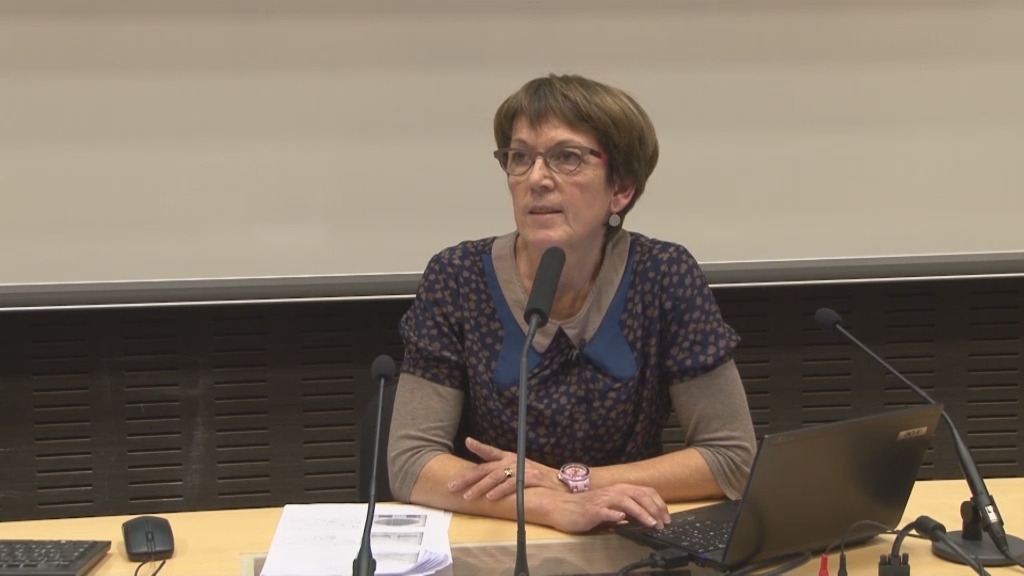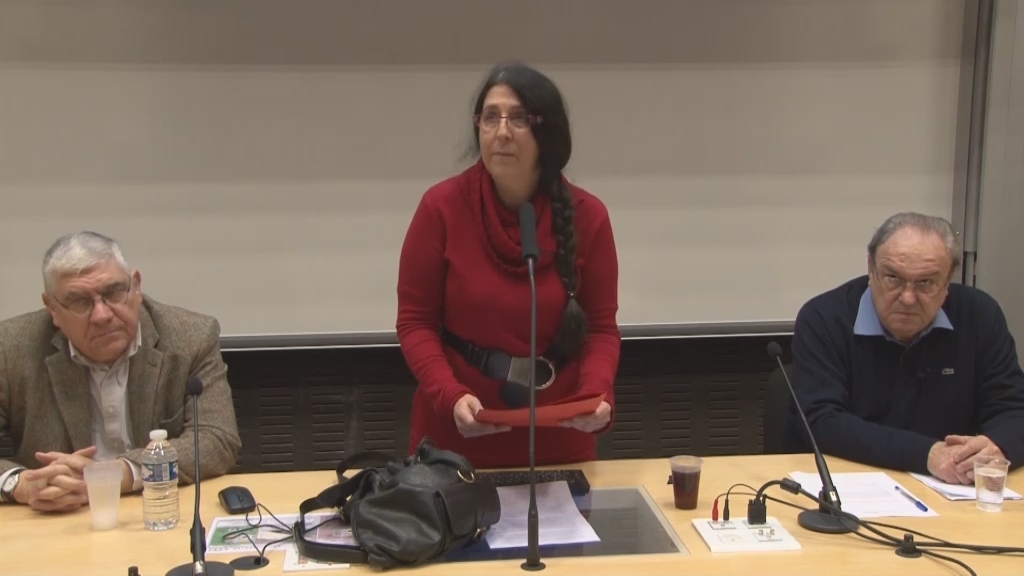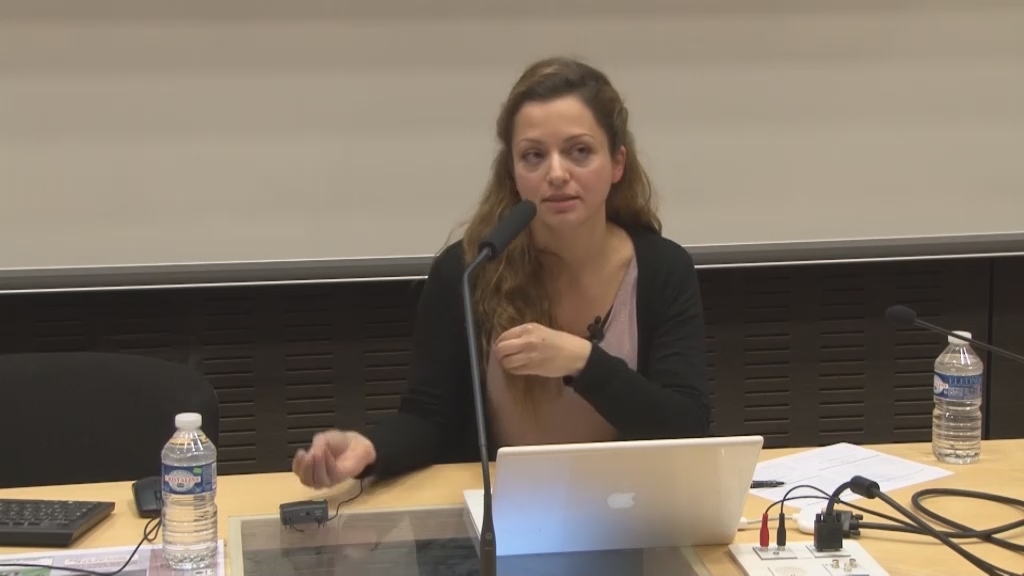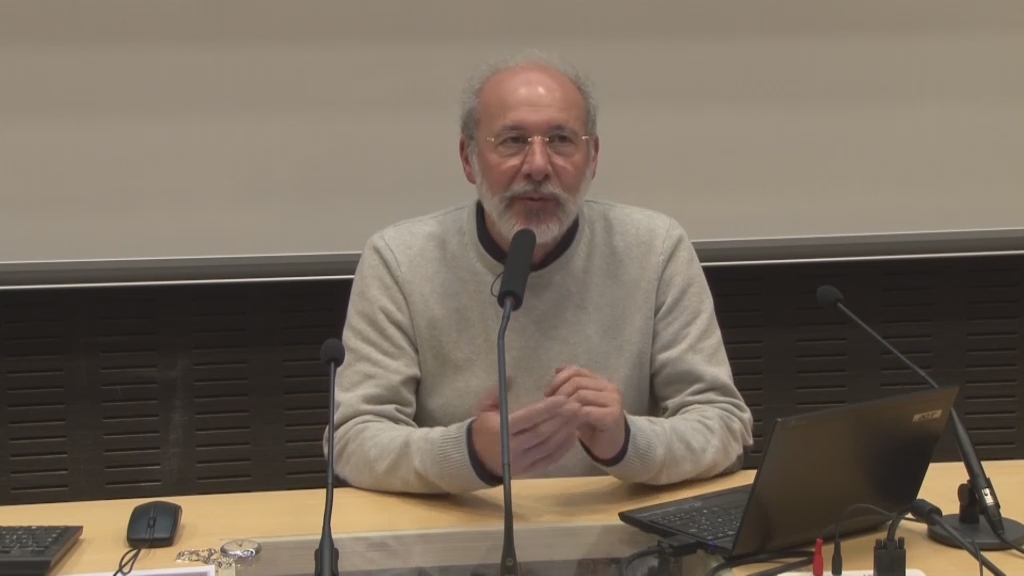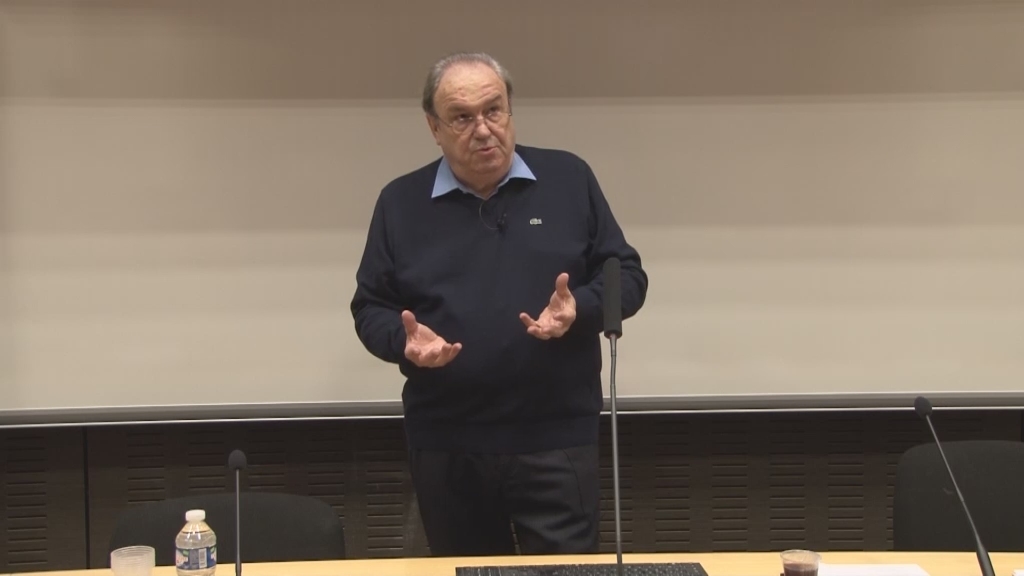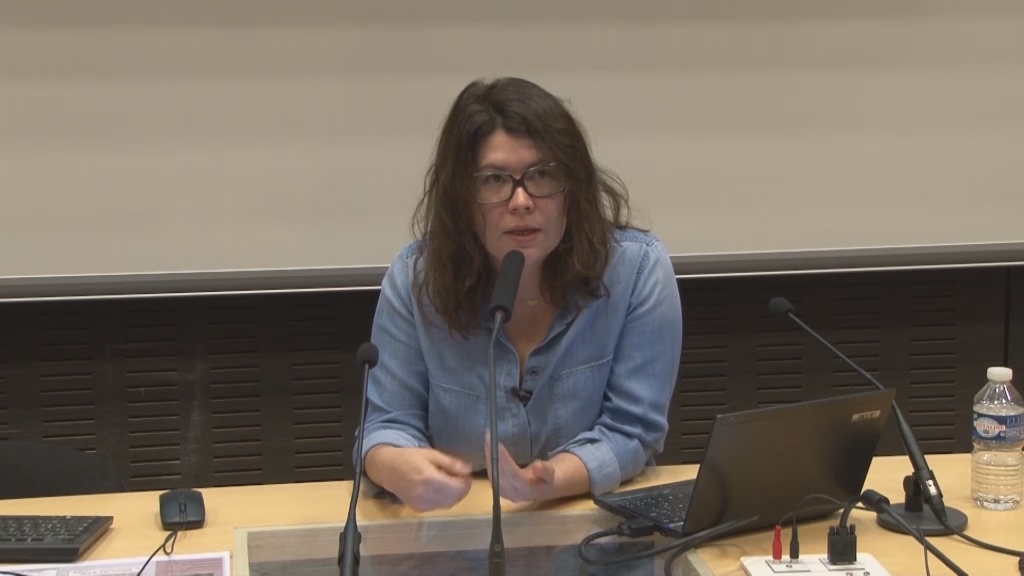Notice
Compounding and lexical recursion in aphasia and in Alzheimer’s disease / Zoltán Bánréti
- document 1 document 2 document 3
- niveau 1 niveau 2 niveau 3
Descriptif
Compounding and lexical recursion in aphasia and in Alzheimer’s disease / Zoltán Bánréti. In "Perspectives neuropsycholinguistiques sur l'aphasie - NeuroPsychoLinguistic Perspectives on Aphasia", colloque international organisé par l'Unité de Recherche Interdisciplinaire Octogone de l'Université Toulouse II-Le Mirail (France). Toulouse, 21-23 juin 2012.
Weexamined the lexical recursion by tests requiring productive andrecursive construction of compound words.Broca’s and conduction aphasic subjects and subjects with moderateAlzheimer’s disease (AD), as well as healthy control subjects wereinvolved in the tests.
SomeHungarian compounds have a binary branching structure in which theconstituents are also binary constructions consisting of furtherwords in turn. The rightmost constituent is a deverbal noun with-ó/-ő(-er/-or) affix.These constituentsare the heads taking left-hand words in the role of complement. Theconstruction can be repeated recursively, the operationis called lexicalrecursion, thesecompounds are recursively structured (Dressler 2006).
The test material consisted of 63 pictures, each accompanied by a statement referring to it. While the subjects were looking at the pictures, they heard statements. Then a question was asked. To response, the subjects had to create compounds of two, three, and four ultimate constituents recursively. We took their performance with respect to two-constituent compounds as results of activating lexical units “ready-made” stored in lexicon. It was their performance in producing three- and four-constituent compounds that we took to be relevant with respect to their recursive abilities. Frequency effects were also considered.
The target three- or four-constituent compounds were all headed by a deverbal noun. First the subjects had to supply a two-part compound, then build a three-part compound based on it, and then a four-part compound based on the latter.
Broca’sand conduction aphasics followed the strategy of lexicalsearch:they produced simplewords with synonym/hyperonym meaning, instead of three- and andfour-constituent compounds. In this way, lexical recursion wasavoided.
Personswith moderate AD preferred the strategy of exitto syntax.Increasing complexity of the target word triggered this strategy, thenumber of responses involving syntactic phrases grew radically. DPsand embedded sentences were produced instead of three- andfour-constituent compounds. AD subjects avoidedlexical recursion by usingthe strategy of exitto syntax. Thenormal control subjects’ performancedid not exhibit these features.
Inother tests we found a deficit of syntactic-structural recursion inBroca’s aphasia but therecursive syntax remained unimpaired in moderate AD(Bánréti-Mészáros-Őrley 2011).
Languagehas recursion outside syntax, too: this is lexical recursion. Theresults are explained by the fact that it is not a single recursiveoperation applied at various linguistic levels but rather there areseveral recursive operations boundto various grammatical subsystems that can be selectively impaired.
Thème
Documentation
Bibliographie sélective
Bánréti, Z. (2010). Recursion in aphasia. Clinical Linguistics & Phonetics 24(11), 906-14.
Bánréti, Z., & Mészáros É., & Hoffmann I., & Örley, Z, (2011). Recursion in language: aphasia and Alzheimer’s disease. In A. Botinis, (Ed), Experimental Linguistics, Proceedings of the fourth ISCA Workshop, 2011. May, Paris: ISCA and University of Athens, 23-27.
Dressler, W.U. (2006) Compound types. In G. Libben, G., J. Gonia (eds), The Representation and Processing of Compound Words. Oxford University Press, 23-44.
> Voir aussi la bibliographie générale à télécharger dans l'onglet "Documents" de la séquence vidéo d'ouverture du colloque.
Dans la même collection
-
Perspectives neuropsycholinguistiques sur l'aphasie - NeuroPsychoLinguistic Perspectives on Aphasia…
Perspectives neuropsycholinguistiques sur l'aphasie - NeuroPsychoLinguistic Perspectives on Aphasia : ouverture. Colloque international organisé par l'Unité de Recherche Interdisciplinaire Octogone de
-
Phonological and phonetic encoding and impairment / Marina Laganaro
LAGANARO Marina
Phonological and phonetic encoding and impairment / Marina Laganaro
-
Entre dysfonctionnement et normalité : une perspective à partir de données anatomo‐fonctionnelles o…
DUBOIS Cyril Michel Robert
LAHYANI Saoussan
Entre dysfonctionnement et normalité : une perspective à partir de données anatomo‐fonctionnelles obtenues auprès de sujets sains et de sujets aphasiques / Saoussan Lahyani, Cyril Dubois. In
-
A « subtle phonetic deficit » in fluent aphasia ? An acoustic and perceptual study / Anna Marczyck
MARCZYCK Anna
A « subtle phonetic deficit » in fluent aphasia ? An acoustic and perceptual study / Anna Marczyck
-
Pour une approche dynamique des réponses aphasiques obtenues en dénomination d’images : apport de l…
TRAN Thi Mai
Pour une approche dynamique des réponses aphasiques obtenues en dénomination d’images : apport de l’analyse qualitative / Thi-Mai Tran, in "Perspectives neuropsycholinguistiques sur l'aphasie -
-
Age of acquisition affects word retrieval in spontaneous speech produced by patients with Alzheimer…
GAYRAUD Frédérique
BARKAT Mélissa
Age of acquisition affects word retrieval in spontaneous speech produced by patients with Alzheimer's disease / Frédérique Gayraud, Mélissa Barkat-Defradas. In "Perspectives neuropsycholinguistiques
-
Morpho-syntactic processing of regular and irregular formations in Arabic aphasia / Tariq Khwaileh
KHWAILEH Tariq
Morpho-syntactic processing of regular and irregular formations in Arabic aphasia / Tariq Khwaileh. In "Perspectives neuropsycholinguistiques sur l'aphasie - NeuroPsychoLinguistic Perspectives on
-
German Broca’s and Wernicke’s aphasics display similar deficits in syntactic performance / Eva Wimm…
WIMMER Eva
German Broca’s and Wernicke’s aphasics display similar deficits in syntactic performance / Eva Wimmer. In "Perspectives neuropsycholinguistiques sur l'aphasie - NeuroPsychoLinguistic Perspectives on
-
Violating canonicity in Spanish agrammatism / Silvia Martínez-Ferreiro
MARTINEZ-FERREIRO Silvia
Violating canonicity in Spanish agrammatism / Silvia Martínez-Ferreiro. In "Perspectives neuropsycholinguistiques sur l'aphasie - NeuroPsychoLinguistic Perspectives on Aphasia", colloque international
-
Sentence comprehension deficits in aphasia : additional insights from impairment-specific assessmen…
HANNE Sandra
Sentence comprehension deficits in aphasia : additional insights from impairment-specific assessment / Sandra Hanne.
-
Principles of bilingual aphasia assessment and interpretation of findings / Michel Paradis
PARADIS Michel
Principles of bilingual aphasia assessment and interpretation of findings / Michel Paradis. In "Perspectives neuropsycholinguistiques sur l'aphasie - NeuroPsychoLinguistic Perspectives on Aphasia",
-
Perioperative language assessment in multilingual patients undergoing awake surgery / Barbara Köpke
KöPKE Barbara
Perioperative language assessment in multilingual patients undergoing awake surgery / Barbara Köpke. In "Perspectives neuropsycholinguistiques sur l'aphasie - NeuroPsychoLinguistic Perspectives on
Sur le même thème
-
How prosody helps infants and children to break into communication
GERVAIN Judit
The talk will present four sets of studies with young infants and children to show who prosody helps them learn about different aspects of language, from learning basic word order through
-
"Déficit phonético-phonologique dans l’aphasie vasculaire : Réflexion sur le rôle des structures sy…
Les locuteurs ayant subi un AVC entrainant une aphasie avec deficit (phonetico-)phonologique realisent, en production orale, des paraphasies qui alterent soit la structure syllabique de leur langue
-
Socialisations langagières et inégalités scolaires / Élisabeth Bautier
BAUTIER Élisabeth
Sous-tendue par la question des inégalités d’apprentissage scolaires et des habitudes langagières de l’école qui sont au cœur de ces inégalités, cette communication porte sur les modes de
-
Jacques Lordat (1773-1870) ou la naissance de la neuropsycholinguistique cognitive. Du vitalisme au…
NESPOULOUS Jean-Luc
Jacques Lordat (1773-1870) a fait une exceptionnelle carrière, d’une cinquantaine d’années, à la Faculté de médecine de Montpellier, dont il fut un temps Doyen. Très tôt, il s’intéressa aux troubles
-
Regards croisés sur la LSF et l'apprentissage du français écrit : table ronde
GARCIA-DEBANC Claudine
Regards croisés sur la LSF et l'apprentissage du français écrit : table ronde, in Journée d'études organisée conjointement par l'École supérieure du professorat et de l'éducation (ESPE, Toulouse), le
-
03 - L’émergence et l’évolution du langage humain du point de vue des neurosciences (Crisco)
Journée d’étude : "Cerveau et Langage", présentée par Jacques FRANCOIS (Université de Caen) et Jean-Luc NESPOULOUS (Toulouse 2 et I.U.F.)
-
06 - Troubles lexico-sémantiques dans l’aphasie : évolution des interprétations (Crisco)
Journée d’étude : "Cerveau et Langage"
-
01 - Ouverture de la journée d'étude : "Cerveau et Langage" (Crisco)
Journée d’étude : "Cerveau et Langage"
-
04 - Langage et représentation spatiale chez des locuteurs avec et sans agrammatisme : analyse des …
Journée d’étude : "Cerveau et Langage", présentée par Jacques FRANCOIS (Université de Caen) et Jean-Luc NESPOULOUS (Toulouse 2 et I.U.F.)
-
07 - Langage et mémoire : les leçons des maladies dégénératives (Crisco)
NESPOULOUS Jean-Luc
FRANçOIS Jacques
Journée d’étude : "Cerveau et Langage", présentée par Jacques FRANCOIS (Université de Caen) et Jean-Luc NESPOULOUS (Toulouse 2 et I.U.F.)
-
02 - La neuropsycholinguistique 150 ans après Paul Broca (Crisco)
Journée d’étude : "Cerveau et Langage", présentée par Jacques FRANCOIS (Université de Caen) et Jean-Luc NESPOULOUS (Toulouse 2 et I.U.F.)
-
05 - Mémoire de travail, fonctions exécutives et aphasie (Crisco)
Journée d’étude : "Cerveau et Langage", présentée par Jacques FRANCOIS (Université de Caen) et Jean-Luc NESPOULOUS (Toulouse 2 et I.U.F.)

